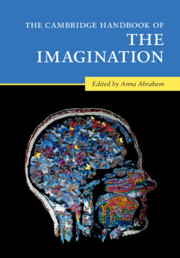Book contents
- The Cambridge Handbook of the Imagination
- The Cambridge Handbook of the Imagination
- Copyright page
- Dedication
- Contents
- Figures
- Contributors
- Acknowledgments
- 1 Surveying the Imagination Landscape
- Part I Theoretical Perspectives on the Imagination
- Part II Imagery-Based Forms of the Imagination
- Part III Intentionality-Based Forms of the Imagination
- Part IV Novel Combinatorial Forms of the Imagination
- 27 On the Interaction Between Episodic and Semantic Representations – Constructing a Unified Account of Imagination
- 28 How Imagination Supports Narrative Experiences for Textual, Audiovisual, and Interactive Narratives
- 29 Development of the Fantasy-Reality Distinction
- 30 Imagining the Real: Buddhist Paths to Wholeness in Tibet
- 31 Hypothetical Thinking
- 32 The Counterfactual Imagination: The Impact of Alternatives to Reality on Morality
- 33 A Look Back at Pioneering Theories of the Creative Brain
- Part V Phenomenology-Based Forms of the Imagination
- Part VI Altered States of the Imagination
- Name Index
- Subject Index
- References
32 - The Counterfactual Imagination: The Impact of Alternatives to Reality on Morality
from Part IV - Novel Combinatorial Forms of the Imagination
Published online by Cambridge University Press: 26 May 2020
- The Cambridge Handbook of the Imagination
- The Cambridge Handbook of the Imagination
- Copyright page
- Dedication
- Contents
- Figures
- Contributors
- Acknowledgments
- 1 Surveying the Imagination Landscape
- Part I Theoretical Perspectives on the Imagination
- Part II Imagery-Based Forms of the Imagination
- Part III Intentionality-Based Forms of the Imagination
- Part IV Novel Combinatorial Forms of the Imagination
- 27 On the Interaction Between Episodic and Semantic Representations – Constructing a Unified Account of Imagination
- 28 How Imagination Supports Narrative Experiences for Textual, Audiovisual, and Interactive Narratives
- 29 Development of the Fantasy-Reality Distinction
- 30 Imagining the Real: Buddhist Paths to Wholeness in Tibet
- 31 Hypothetical Thinking
- 32 The Counterfactual Imagination: The Impact of Alternatives to Reality on Morality
- 33 A Look Back at Pioneering Theories of the Creative Brain
- Part V Phenomenology-Based Forms of the Imagination
- Part VI Altered States of the Imagination
- Name Index
- Subject Index
- References
Summary
People often create counterfactual alternatives to reality about how things could have been different “if only …” The creation of alternatives has widespread effects in daily mental life: It enables people to explain the past, to prepare for the future, and to experience emotions such as regret and guilt. In this chapter I consider the profound impact of the counterfactual imagination on everyday thought by focusing on its impact on moral judgments such as blame and responsibility. Insights from the study of imagination and morality shed light on the mechanisms underlying the counterfactual imagination: simulation processes that construct an alternative to reality by mutating aspects of the mental representation of reality. The relationship between the imagination and morality is two-way: On the one hand, counterfactuals affect moral judgments because people rely on them to identify causes of an outcome and to probe a person’s intentions and knowledge. On the other hand, moral thoughts affect the imagination because moral norms provide important “fault lines,” “junctures” in the mental representation of reality that affect the accessibility of imagined alternatives. The two-way relationship corroborates the idea that the imagination depends on cognitive processes shared with reasoning.
- Type
- Chapter
- Information
- The Cambridge Handbook of the Imagination , pp. 529 - 547Publisher: Cambridge University PressPrint publication year: 2020



